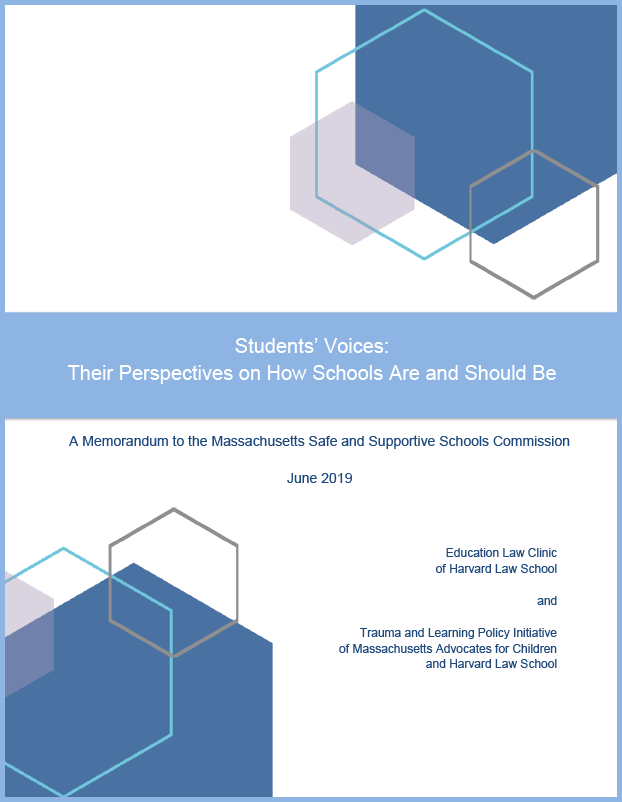Students on Relationships with Teachers
Almost universally, students have shared that they want respectful relationships with their teachers. They have expressed how important it is for their teachers to believe in them and to understand them as whole people, not just as academic learners.
“We need the adults at the school to be a positive example for us. They can help us get better by listening to students’ ideas to create a better school environment. Can we work together to get some learning done?”
— Melanie
“I noticed that my teacher put a ‘Protect Trans Kids’ sticker on her computer. It made me feel really happy to know that she would support me and be there for me if I needed her.”
— Adam
“When teachers create a positive—emotionally safe classroom—I see that I learn best: this is the optimal learning environment for students.” — Ethan
“My high school isn’t exactly the best when it comes to supporting those who are LGBT. For example, one of the health teachers tended to mistreat those who are different from him and he once used harmful language to describe mental health issues amongst certain individuals. As a result of this, I felt incredibly hurt by his remark.”— Chloe
Video featuring: —Sophie
“Teachers should focus on building relationships with their students. We need to know that teachers care. We want them to care about what we know and what we feel and what we need. Not only do we need to feel physically safe but also academically safe to share our thoughts and contribute to class. And we need to feel comfortable enough to share when we are struggling and need support.” — Juan
“Students are more motivated to learn when they see that the teachers actually care. If a teacher is not motivational, the students will not be motivated.” — Amayra
“My teacher guides us by giving us the basis of what we need and it there to help us, but doesn’t just lecture us.” — Trish
“When teachers recognize the good work that you do, you bond with the teacher. It creates a community, which is something that was missing during the pandemic, and something we need now more than ever.”— Jaydah
Video featuring: —Ethan
“Fun and supportive teachers really make a difference. My English teacher is a good example of this. She jokes around with us, but we still get all of our work done. We can do both: there’s a time for us to play and there’s a time for us to do work. Even if I’m having a bad day, I’m still going to talk in her class.”
— Amayra
“From the start of the school year, my math teacher established a comfortable rapport with each individual student… He inquired about our personal lives in order to better grasp our needs and understand how he could help us succeed. That relationship and quality have really aided my ability to engage in class.”
— Sophie
“Some teachers feel unapproachable when we have challenges and this fuels our anxiety, making it harder to engage. Being able to communicate regarding extensions and heaviness of workload would ease our anxiety. Breaking down these barriers would also allow for a sense of connection more generally and help us to feel more supported.”
— Haverhill High School VIP Report
“My math teacher was very direct about who she didn’t like, and I was one of those kids. I would mess up and she would make a big deal out of it in front of the whole class. … Her version of strictness did not make me feel safe or supported in her class, and this affected my learning.”— Ethan
“We didn’t have to talk about our experiences; we were just able to be honest and vulnerable about ourselves and our experiences without any judgment. That experience helped me to feel safe with my peers and with my teachers. I could understand them and their struggles better, and they could understand me and mine without having to explain. We could all just be ourselves, no questions asked.”
— Briar
 “I feel like some classes would be more productive if the teacher…makes an effort to understand your side, and you feel comfortable talking to the teacher, class will go more easily. You won’t be afraid to ask questions. Sometimes I feel like that’s what students struggle with, like they might be struggling in class, but they don’t feel comfortable talking to the teacher so they just stay in the back, and then they might fail because of that.”
“I feel like some classes would be more productive if the teacher…makes an effort to understand your side, and you feel comfortable talking to the teacher, class will go more easily. You won’t be afraid to ask questions. Sometimes I feel like that’s what students struggle with, like they might be struggling in class, but they don’t feel comfortable talking to the teacher so they just stay in the back, and then they might fail because of that.”
— Focus Group Report
[A]s students, some of us spend more time with teachers and counselors than we do with our own families. They are the people who teach us and help set us up for our futures. We want to feel understood and accepted.”
— Taeyah
“Every teacher could be supported to build relationships with students. … Every teacher will have his or her own style, but there are so many ways to show your students you care and to build that environment of trust.”— Alice
“She put her hand out to me before I had to put mine out to her. In other words, she took the first step to make a connection. When you have this kind of connection and a teacher who is willing to work with you, this makes you feel that you can do anything.”— Gabriela
“In the months leading up to the pandemic, there were a lot more racial incidents and the school responded by having several of the black students lead restorative circles with our teachers. These meetings were organized so that other black students and I could share what was going on from our perspective and how it affected us. But many of us found this difficult.”— Anonymous-2
“For some teachers, they feel like they don’t have enough time to cover the curriculum, and it would be hard for them to take time out of class to spend on relationship-building. I think we could give teachers designated time during the day to check in on students and start forming closer relationships with them.”
— Trish
“I benefited from special ed teachers who helped me see that the IEP was there to help me. So many students don’t think of the IEP as something positive; it is more like something to be embarrassed about. We shouldn’t feel second class for having an IEP. I personally am able to be open with my teachers when I need help.”— Chris

